SCOTLAND
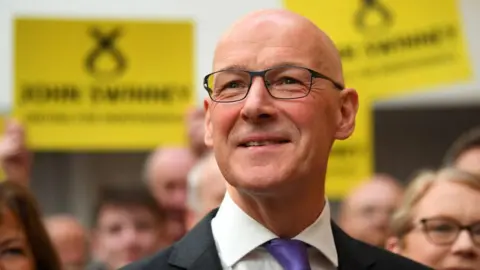
BBC
SNP leadership front-runner John Swinney is expected to succeed Humza Yousaf unopposed after a potential challenger withdrew his bid at the 11th hour.
Earlier it emerged that veteran SNP activist Graeme McCormick, who has been openly critical of the Scottish government, had secured a nomination.
However he then announced that although he had met the threshold of support needed to secure a nomination, he had decided not to proceed and would back Mr Swinney instead.
This came after a “lengthy and fruitful conversation” with Mr Swinney in which Mr McCormick said they had "agreed the challenges" which the SNP, the government and the people faced.
Swinney warns of SNP rebuild delay if leader bid challenged
Who is John Swinney, the sole candidate for first minister?
How will Scotland's next first minister be chosen?
This means Mr Swinney is expected to be elected leader of the SNP after nominations close at midday on Monday.
Mr Yousaf resigned after just over a year in the role following the fallout from the decision to terminate a power-sharing deal with the Scottish Greens.
Mr Swinney announced he was putting his name forward as he gave a speech at an event in Edinburgh last week.
Mr Swinney, 60, previously led the SNP between 2000 and 2004 and said he would not be "interim leader" or a “caretaker,” adding he intended to see out a full term.
On Sunday he suggested that rebuilding the SNP could be delayed if another candidate were to enter the leadership race - though said he would engage with internal party democracy.
His preference, he said, was to "get on with things" as the party had not been as cohesive as it should have been in recent years.
Leadership candidates are required to get 100 nominations from at least 20 local SNP branches before standing in the race.
Mr McCormick is a retired lawyer and stood against Mike Russell to become party president in 2023, losing by 599 votes to 79.
He previously argued for abolishing tax and replacing it with an annual rent on land, and that the route to Scottish independence lay through international treaties, with Scotland dissolving the union immediately if the SNP returned the most MPs in Scotland at a general election.
In a speech at the party conference in October last year, he described the SNP government as being like “flatulence in a trance”.
Late on Sunday, Mr McCormick released a statement saying he and Mr Swinney had "explored new thinking on a range of issues" that would "inspire activists" within the SNP and in the wider independence movement.
Confirming he was backing Mr Swinney, he said: "This is a fresh start for our members and our politicians, and I’m sure that John’s determination to deliver Independence will be rewarded at the forthcoming general election."
SNP leadership front-runner John Swinney is expected to succeed Humza Yousaf unopposed after a potential challenger withdrew his bid at the 11th hour.
Earlier it emerged that veteran SNP activist Graeme McCormick, who has been openly critical of the Scottish government, had secured a nomination.
However he then announced that although he had met the threshold of support needed to secure a nomination, he had decided not to proceed and would back Mr Swinney instead.
This came after a “lengthy and fruitful conversation” with Mr Swinney in which Mr McCormick said they had "agreed the challenges" which the SNP, the government and the people faced.
Swinney warns of SNP rebuild delay if leader bid challenged
Who is John Swinney, the sole candidate for first minister?
How will Scotland's next first minister be chosen?
This means Mr Swinney is expected to be elected leader of the SNP after nominations close at midday on Monday.
Mr Yousaf resigned after just over a year in the role following the fallout from the decision to terminate a power-sharing deal with the Scottish Greens.
Mr Swinney announced he was putting his name forward as he gave a speech at an event in Edinburgh last week.
Mr Swinney, 60, previously led the SNP between 2000 and 2004 and said he would not be "interim leader" or a “caretaker,” adding he intended to see out a full term.
On Sunday he suggested that rebuilding the SNP could be delayed if another candidate were to enter the leadership race - though said he would engage with internal party democracy.
His preference, he said, was to "get on with things" as the party had not been as cohesive as it should have been in recent years.
Leadership candidates are required to get 100 nominations from at least 20 local SNP branches before standing in the race.
Mr McCormick is a retired lawyer and stood against Mike Russell to become party president in 2023, losing by 599 votes to 79.
He previously argued for abolishing tax and replacing it with an annual rent on land, and that the route to Scottish independence lay through international treaties, with Scotland dissolving the union immediately if the SNP returned the most MPs in Scotland at a general election.
In a speech at the party conference in October last year, he described the SNP government as being like “flatulence in a trance”.
Late on Sunday, Mr McCormick released a statement saying he and Mr Swinney had "explored new thinking on a range of issues" that would "inspire activists" within the SNP and in the wider independence movement.
Confirming he was backing Mr Swinney, he said: "This is a fresh start for our members and our politicians, and I’m sure that John’s determination to deliver Independence will be rewarded at the forthcoming general election."
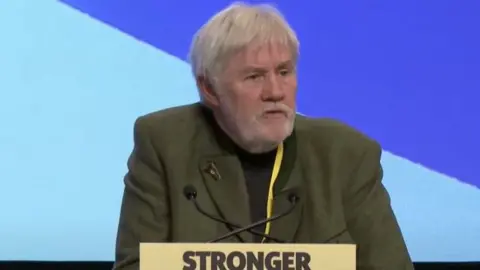
SNP Graeme McCormick speaking at the SNP Conference in October
Former SNP leadership candidate Kate Forbes confirmed earlier she was not standing and backed Mr Swinney, having been promised a "significant" cabinet role if he becomes first minister.
If no other candidate meets the nomination deadline, Mr Swinney would be free to seek parliamentary approval to become first minister.
Mr Yousaf has decided to stay on in the role until a replacement is selected.
Once his resignation has been accepted by the King, parliament has 28 days to select a replacement.
There will then be a vote in the chamber to decide the new first minister, which is passed by a simple majority.
The SNP has 63 seats in the parliament, which means it does not have a majority, but the vote is likely to pass regardless.
The parliament's presiding officer then recommends to the King that the winner be appointed as the new first minister.
A swearing-in ceremony at the Court of Session in Edinburgh could take place as early as Wednesday.
At that point, Mr Swinney would officially become first minister.
Greens deal collapse
Mr Yousaf announced his intention to step down from the role last Monday.
He had ended the Bute House Agreement with the Scottish Greens, leaving him short of support for the minority SNP government at Holyrood.
He would have faced two votes of no confidence in his leadership last week had he not stood down.
Yousaf says he 'paid price' for upsetting Greens
Humza Yousaf quits as Scotland's first minister
Who is Humza Yousaf? The rise and fall of a first minister
The Scottish Conservatives dropped their motion after his departure was confirmed, while Scottish Labour's - which was a vote of confidence in the entire government - was defeated with backing from the Greens.
His resignation came 13 months after defeating Ms Forbes and Ash Regan, who has since defected to the Alba Party, in the race to replace Nicola Sturgeon.
He became the first ethnic minority leader of a devolved government in the UK and the first Muslim to lead a major UK party.
In his resignation speech, he said he had “clearly underestimated” the hurt he had caused the Greens by ending the agreement and said his replacement would be tasked with "repairing our relationship across the political divide".
Former SNP leadership candidate Kate Forbes confirmed earlier she was not standing and backed Mr Swinney, having been promised a "significant" cabinet role if he becomes first minister.
If no other candidate meets the nomination deadline, Mr Swinney would be free to seek parliamentary approval to become first minister.
Mr Yousaf has decided to stay on in the role until a replacement is selected.
Once his resignation has been accepted by the King, parliament has 28 days to select a replacement.
There will then be a vote in the chamber to decide the new first minister, which is passed by a simple majority.
The SNP has 63 seats in the parliament, which means it does not have a majority, but the vote is likely to pass regardless.
The parliament's presiding officer then recommends to the King that the winner be appointed as the new first minister.
A swearing-in ceremony at the Court of Session in Edinburgh could take place as early as Wednesday.
At that point, Mr Swinney would officially become first minister.
Greens deal collapse
Mr Yousaf announced his intention to step down from the role last Monday.
He had ended the Bute House Agreement with the Scottish Greens, leaving him short of support for the minority SNP government at Holyrood.
He would have faced two votes of no confidence in his leadership last week had he not stood down.
Yousaf says he 'paid price' for upsetting Greens
Humza Yousaf quits as Scotland's first minister
Who is Humza Yousaf? The rise and fall of a first minister
The Scottish Conservatives dropped their motion after his departure was confirmed, while Scottish Labour's - which was a vote of confidence in the entire government - was defeated with backing from the Greens.
His resignation came 13 months after defeating Ms Forbes and Ash Regan, who has since defected to the Alba Party, in the race to replace Nicola Sturgeon.
He became the first ethnic minority leader of a devolved government in the UK and the first Muslim to lead a major UK party.
In his resignation speech, he said he had “clearly underestimated” the hurt he had caused the Greens by ending the agreement and said his replacement would be tasked with "repairing our relationship across the political divide".
John Swinney indicates his SNP Government will reach out to unionists to pass laws and budgets
John Swinney has admitted the SNP must “change how it talks to people” from across the political divide as he suggested he will reach out to unionist opponents to pass legislations and budgets
By David Bol
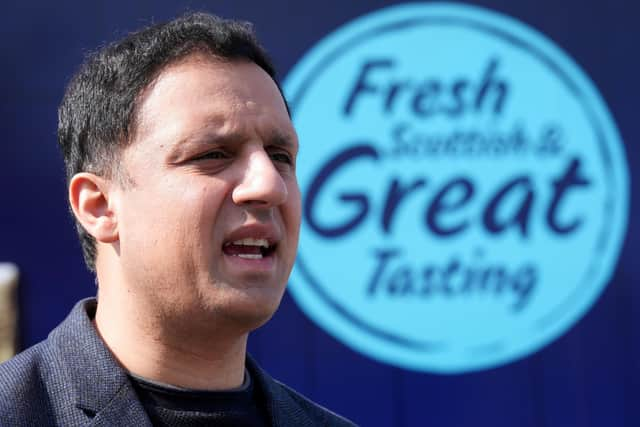
John Swinney has admitted the SNP must “change how it talks to people” from across the political divide as he suggested he will reach out to unionist opponents to pass legislations and budgets
By David Bol
THE SCOTSMAN
Published 5th May 2024
John Swinney has warned opposition unionist parties they have a “responsibility and an obligation” to help an SNP minority government pass budgets as he eyes up becoming Scotland’s next first minister.
In an apparent dig at his predecessor Humza Yousaf, Mr Swinney has admitted the SNP must “change how it talks to people” on the other side of the political divide to make progress as a minority government.
Mr Swinney is set to become the next SNP leader, despite an apparent last-minute bid for attention by an outspoken party activist who claims to have enough support to challenge Mr Swinney.
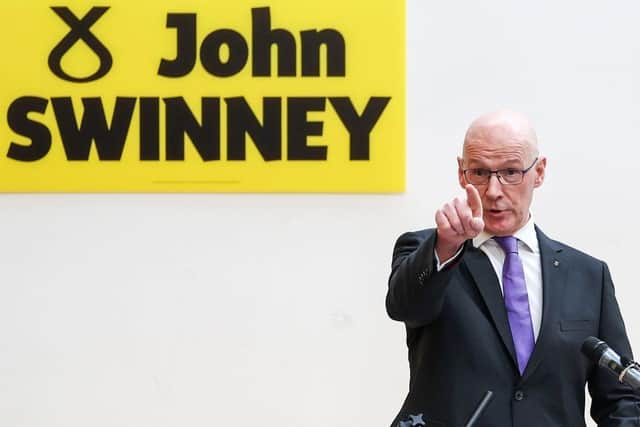 J
J
Published 5th May 2024
John Swinney has warned opposition unionist parties they have a “responsibility and an obligation” to help an SNP minority government pass budgets as he eyes up becoming Scotland’s next first minister.
In an apparent dig at his predecessor Humza Yousaf, Mr Swinney has admitted the SNP must “change how it talks to people” on the other side of the political divide to make progress as a minority government.
Mr Swinney is set to become the next SNP leader, despite an apparent last-minute bid for attention by an outspoken party activist who claims to have enough support to challenge Mr Swinney.
 J
John Swinney is expected to become the next first minister and SNP leader. Picture: Jeff J Mitchell/Getty Images
The former deputy first minister suggested he would move the SNP back to the centre-ground of politics after the Bute House Agreement with the Greens was ripped up.
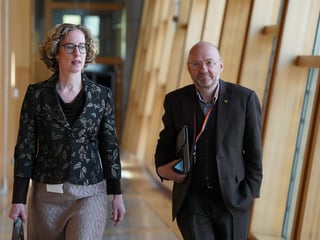
Read MoreGreens could refuse to prop up Swinney government if he shifts SNP to centre gro...
But a Greens source had told Scotland on Sunday that “if the SNP moves too far to the right, they would need to look elsewhere to get their policies and budgets passed”, adding “we are not here to simply endorse an SNP minority government”.
Now Mr Swinney has signalled he will reach out to unionist parties such as Labour, the Liberal Democrats and the Conservatives in order to pass legislation and budgets as he draws up his plans to push ahead with a minority SNP government at Holyrood.
The former deputy first minister suggested he would move the SNP back to the centre-ground of politics after the Bute House Agreement with the Greens was ripped up.

Read MoreGreens could refuse to prop up Swinney government if he shifts SNP to centre gro...
But a Greens source had told Scotland on Sunday that “if the SNP moves too far to the right, they would need to look elsewhere to get their policies and budgets passed”, adding “we are not here to simply endorse an SNP minority government”.
Now Mr Swinney has signalled he will reach out to unionist parties such as Labour, the Liberal Democrats and the Conservatives in order to pass legislation and budgets as he draws up his plans to push ahead with a minority SNP government at Holyrood.

Scottish Labour leader Anas Sarwar (Photo: Andrew Milligan/PA Wire)
Mr Swinney said he would build a consensus with other parties by “engaging in respectful and courteous dialogue within the Parliament”, insisting “I believe in mainstream politics”.
He told the BBC’s Sunday Show: “I believe the SNP should pursue a moderate left-of-centre policy programme – that is where I come from politically. I want to make sure that is successful. We will bring these proposals forward to Parliament and work with others to advance those proposals.”
Asked if a minority government under his leadership could be propped up by anyone other than the Scottish Greens, Mr Swinney said: “I think we probably can do.”
He pointed to recent legislation on keeping the ‘Promise’ to care-experienced young people where SNP minister Natalie Don was able to “reach agreements with Labour and Liberal Democrat members about amendments to that Bill”.
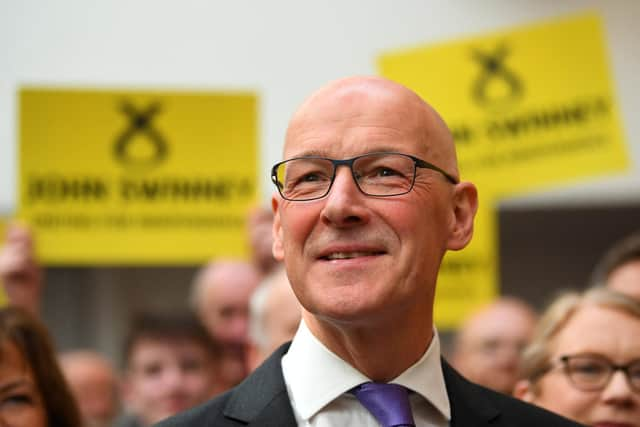
Mr Swinney said he would build a consensus with other parties by “engaging in respectful and courteous dialogue within the Parliament”, insisting “I believe in mainstream politics”.
He told the BBC’s Sunday Show: “I believe the SNP should pursue a moderate left-of-centre policy programme – that is where I come from politically. I want to make sure that is successful. We will bring these proposals forward to Parliament and work with others to advance those proposals.”
Asked if a minority government under his leadership could be propped up by anyone other than the Scottish Greens, Mr Swinney said: “I think we probably can do.”
He pointed to recent legislation on keeping the ‘Promise’ to care-experienced young people where SNP minister Natalie Don was able to “reach agreements with Labour and Liberal Democrat members about amendments to that Bill”.

John Swinney wants to reach out to opposition leaders (Picture: Andy Buchanan/AFP via Getty Images)
But pressed over whether his unionist opponents would help pass a budget, given the hostile stand-off with the SNP over the constitution and other key issues, Mr Swinney said: “I don’t think we should rule that out.”
He added: “In the past I have had Liberal Democrat, Labour, Conservative, Green support for budgets.” The Perthshire North MSP said that if opposition parties would block his budgets on principle against an SNP government, “that’s their problem”.
“That won’t pay teachers, it won’t pay nurses,” he said. “It won’t make sure we can get operations done in our hospitals. If you don’t pass a budget, you can’t fund your public services. There becomes a responsibility on all of us.
“If we go back to 2009 when one of my budgets didn’t go through Parliament on the first time of asking, within a couple of weeks, the budget was passed – virtually in its entirety from what I had originally proposed. The opposition parties were challenged about how hospitals were going to be funded or schools were going to be funded or councils were going to be funded and they didn’t have any answers.”
Mr Swinney said: “A budget process puts a responsibility and an obligation on everybody, not just the Government. I accept the Government’s got to act differently to try to get people on board. The Government’s got to change how it talks to people.”
However, unionist party leaders have not indicated they would work more openly with an SNP Government headed by Mr Swinney.
Scottish Labour leader Anas Sarwar told the BBC “there is still a deeply chaotic and divided political party that I think has broken its trust with the Scottish people”.
“All of this is about managing his [Swinney’s] political party rather than running the country,” Mr Sarwar said. "I didn’t hear anything from John Swinney around any new direction around fixing our NHS, around getting our education system back on track.”
Labour national campaign co-ordinator Pat McFadden said his party was “not planning alliances” with the SNP “or anyone”.
Mr McFadden said a change in SNP leader “doesn’t make much difference”, in the wake of Mr Yousaf announcing his resignation as First Minister a week ago.
Asked if he “could imagine” Labour and the SNP working together if his party does not win a majority at a general election, Mr McFadden told Sky News’s Sunday Morning With Trevor Phillips “no”.
He said: “Our aim is to win a majority, to govern, to meet the mood for change, and we’re not planning any alliances or pacts with anyone.”
Scottish Conservative chairman Craig Hoy insisted “John Swinney is the ultimate continuity leader”.
He said: “He was joined at the hip to the disgraced Nicola Sturgeon and central to the cynical cover-ups and policy failures that characterised her government – especially as education secretary when Scotland fell sharply in the international rankings.”
Nominations for the SNP leadership close at noon on Monday. But one fly in the ointment of a coronation for Mr Swinney could be a suggestion that party activist Graeme McCormick used the independence march in Glasgow on Saturday to drum up support for his candidacy.
It is understood Mr McCormick believes he is very likely to receive the 100 nominations from at least 20 SNP branches before the Monday deadline, but no proof has yet been provided.
Should Mr McCormick receive the required nominations, a three-week leadership contest will be triggered, with ballots opening on Monday, May 13 and closing on May 27.
Mr McCormick has previously been critical of the SNP-led Scottish Government, using last year’s party conference to criticise its independence strategy.
Amid the speculation that a leadership contest would delay him becoming first minister, Mr Swinney said he would like to get on with that job “as quickly as possible”.
The former deputy first minister said he would respect the “democratic process” if there was a contest. But he added: “I think the SNP has got a chance to start rebuilding from the difficult period that we have had, under my leadership, and bluntly, I’d just like to get on with that as quickly as I possible can do, because every day that we spend in an internal contest, which I think we all probably know the outcome of, we delay the possibility for the SNP to start its rebuilding.”
But pressed over whether his unionist opponents would help pass a budget, given the hostile stand-off with the SNP over the constitution and other key issues, Mr Swinney said: “I don’t think we should rule that out.”
He added: “In the past I have had Liberal Democrat, Labour, Conservative, Green support for budgets.” The Perthshire North MSP said that if opposition parties would block his budgets on principle against an SNP government, “that’s their problem”.
“That won’t pay teachers, it won’t pay nurses,” he said. “It won’t make sure we can get operations done in our hospitals. If you don’t pass a budget, you can’t fund your public services. There becomes a responsibility on all of us.
“If we go back to 2009 when one of my budgets didn’t go through Parliament on the first time of asking, within a couple of weeks, the budget was passed – virtually in its entirety from what I had originally proposed. The opposition parties were challenged about how hospitals were going to be funded or schools were going to be funded or councils were going to be funded and they didn’t have any answers.”
Mr Swinney said: “A budget process puts a responsibility and an obligation on everybody, not just the Government. I accept the Government’s got to act differently to try to get people on board. The Government’s got to change how it talks to people.”
However, unionist party leaders have not indicated they would work more openly with an SNP Government headed by Mr Swinney.
Scottish Labour leader Anas Sarwar told the BBC “there is still a deeply chaotic and divided political party that I think has broken its trust with the Scottish people”.
“All of this is about managing his [Swinney’s] political party rather than running the country,” Mr Sarwar said. "I didn’t hear anything from John Swinney around any new direction around fixing our NHS, around getting our education system back on track.”
Labour national campaign co-ordinator Pat McFadden said his party was “not planning alliances” with the SNP “or anyone”.
Mr McFadden said a change in SNP leader “doesn’t make much difference”, in the wake of Mr Yousaf announcing his resignation as First Minister a week ago.
Asked if he “could imagine” Labour and the SNP working together if his party does not win a majority at a general election, Mr McFadden told Sky News’s Sunday Morning With Trevor Phillips “no”.
He said: “Our aim is to win a majority, to govern, to meet the mood for change, and we’re not planning any alliances or pacts with anyone.”
Scottish Conservative chairman Craig Hoy insisted “John Swinney is the ultimate continuity leader”.
He said: “He was joined at the hip to the disgraced Nicola Sturgeon and central to the cynical cover-ups and policy failures that characterised her government – especially as education secretary when Scotland fell sharply in the international rankings.”
Nominations for the SNP leadership close at noon on Monday. But one fly in the ointment of a coronation for Mr Swinney could be a suggestion that party activist Graeme McCormick used the independence march in Glasgow on Saturday to drum up support for his candidacy.
It is understood Mr McCormick believes he is very likely to receive the 100 nominations from at least 20 SNP branches before the Monday deadline, but no proof has yet been provided.
Should Mr McCormick receive the required nominations, a three-week leadership contest will be triggered, with ballots opening on Monday, May 13 and closing on May 27.
Mr McCormick has previously been critical of the SNP-led Scottish Government, using last year’s party conference to criticise its independence strategy.
Amid the speculation that a leadership contest would delay him becoming first minister, Mr Swinney said he would like to get on with that job “as quickly as possible”.
The former deputy first minister said he would respect the “democratic process” if there was a contest. But he added: “I think the SNP has got a chance to start rebuilding from the difficult period that we have had, under my leadership, and bluntly, I’d just like to get on with that as quickly as I possible can do, because every day that we spend in an internal contest, which I think we all probably know the outcome of, we delay the possibility for the SNP to start its rebuilding.”
No comments:
Post a Comment